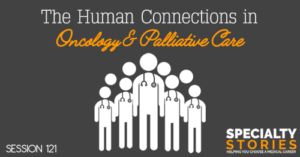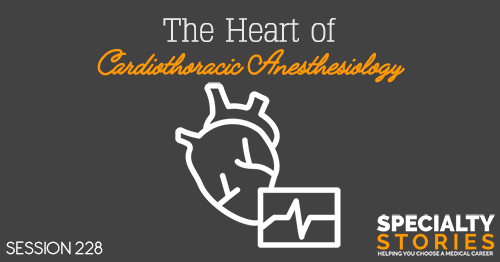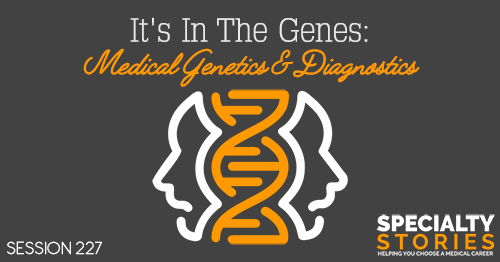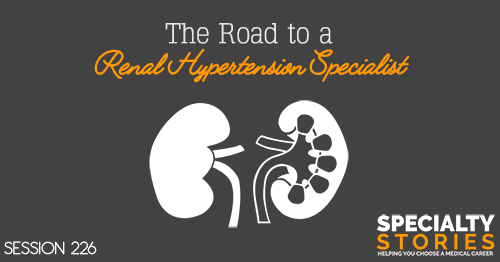Apple Podcasts | Google Podcasts

Session 121
Dr. Elizabeth Wulff-Burchfield is a medical oncologist and palliative care physician. Today we’ll touch on relationships, burnouts, and knowing when to step away. Be sure to check out all our other podcasts on Meded Media.
Listen to this podcast episode with the player above, or keep reading for the highlights and takeaway points.
[01:10] Interest in Oncology and Palliative Care
The medical school she went to had a different curriculum. They had one year in the classroom, one year in the hospital, one year doing research, and the final year in the hospital again.
During their second year, they had these intercessions where they would all come together as one class. They talked about specialties and fields spanning multiple disciplines. One of them was oncology.
She just fell in love with what she was hearing about the relationships clinicians had with their patients. They were intense relationships important to both parties.
'Oncology encompasses a lot of fields. It encompasses medical oncology, hematology, radiation oncology, surgery, etc.'Click To TweetShe found herself most skilled as a shepherd. She was shepherding patients and their loved ones through difficult and scary things. She also knew she was a relationship-driven person. Even in inpatient medicine, she would get distressed due to the rotating door of quick relationships. She wanted something longer.
Throughout her core rotations, it became very clear throughout that year that she was meant to be an internist.
During her third year, they had a continuity clinic. One of the oncology fellows she had known had worked with one of the internal medicine faculty who was also palliative care in his continuity clinic during his third year. She worked with this well-known palliative care physician. And Elizabeth thought the way he talked to patients was incredible.
'I've never seen anyone talk to a patient like this and really understand who they are and make decisions based on who they are, not just what's possible.'Click To TweetSo she used that year to see if palliative care felt like her and it did. She also knew that oncology was going to be a part of her life. As a fourth-year medical student, she explored the possibility of doing both. Everything just felt right so she carried on with it. She now feels she is living her dream.
[Related episode: What is Hematology/Oncology? An Academic Doc Discusses]
[07:20] Dealing with the Emotional Weight
Elizabeth’s faculty position is 50% protected research time and 50% clinical. She thinks it would be harder for her it was all clinical time. What’s cool about doing research is you get to affect change on a greater level.
She admits there are sad parts about her job. Regardless of the specialty, there are things that are devastating because the world is a broken place in some ways. There are always sad things.
Elizabeth explains that they are able to cope not because they’re martyrs or their super strong. It’s because they are relationship-driven.
'The relationship I get to have with the patient is worth all the hurt because that feeds me.'Click To TweetHer relationship with the patient feeds her soul to get to know these men and women and the people who love them. It feeds her souls to understand and just get to soak up their life experiences and their wisdom.
She gets to rejoice with them when things are going the way they’re hoping or when they mend relationships. It’s because the cancer brings the important things into the forefront of their mind and heart.
She also gets to grieve with them, not only when they die, but when they have a scan that shows they’re progressing or if they get too sick to do more treatment.
Almost all of her patients in her oncology clinic are going to past away with their cancer. Not all her palliative care clinic pass away with cancer. But she gets to be a part of it so much and it’s central to who she is. She gets to be a part of their story that’s meaningful to her and it just makes up for it.
[Related episode: 6 Tips For Improving Patient Communication]
[10:18] Types of Patients
'There's a real difference between focused hope and intrinsic hope.'Click To TweetElizabeth explains it depends on what you treat and whether your patients are going to be cured of their cancer or not.
There are some patients where the standard of care for managing their localized or curable cancer includes chemotherapy or immunotherapy. When they come to an oncologist, part of their treatment focused on cure includes one of those treatments. So they have a reason to see a medical oncologist that is still within the paradigm of cure.
For instance, many patients with breast cancer end up having a treatment paradigm that looks like surgery, then radiation, and some kind of chemotherapy or hormonal therapy. The medicines are prescribed by a medical oncologist.
Another example is that patients with Stage III colon cancer would have their surgery called a colectomy. Then they’d see a medical oncologist and get chemotherapy for a time-limited period.
People who treat those diseases fall in that bucket where the hope of everybody is they’re going to get cured.
For her patients, she does genitourinary medical oncology. She sees cancers related to the kidney, bladder, and prostate. Most patients who need a medical oncologist and have one of those diseases, need her because they already have metastatic or Stage IV disease.
There are exceptions to that such as patients with high-risk prostate cancer who receive hormonal therapy and radiation. There are also bladder cancer patients who get chemotherapy followed by surgery.
All patients with kidney cancer and most patients with prostate cancer that see her would be because they have Stage IV disease.
That being said, they have tons of new treatments. It’s incredible what the treatments can “buy” them in terms of longevity and quality of life. But for the specific diseases she treats, most people have Stage IV disease and that’s why they have to see her.
'Even though many of these folks have metastatic disease, they have very different disease courses, have different treatments available to them. It ends up being a good mix.'Click To TweetMoreover, Elizabeth emphasized that she is at her best around a high-functioning team. She works closely with urologic oncologists. They work in an interdisciplinary way. They also follow patients for really long periods of time even to the end of their life. They also work a lot with radiation oncologists.
[15:45] Traits that Lead to Becoming a Good Oncologist and Palliative Care Physician
One should be able to thrive in an interdisciplinary team environment. Depending on what diseases you treat and the setting, a lot of that is very interdisciplinary.
Palliative care is interdisciplinary in a different way in that a lot of palliative initiatives and programs are primarily led by nurses, or social workers, or chaplains. It’s a very flattened hierarchy in palliative care.
'Being loving and living for the team is key.'Click To TweetBeing a good communicator is also good. A lot of outpatient palliative care is about managing symptoms as well as helping with communication between the medical team and the patients and their loved ones.
One has to be relationship-driven, not just in your own work team but wanting to follow patients longitudinally and be a part of their lives.
They may also do primary care work depending on the clinical scenario. For a lot of her patients, she is actually becoming their primary care provider as they’re going through this just because they see these folks all the time. They see them so much even weekly or bi-weekly.
[Related episode: What Does It Take to Be a Surgical Oncologist?]
[19:00] Typical Week
On Mondays, she has a full day of oncology clinic. Tues and Weds are research days. Her entire Thursday is spent in clinic, a split between palliative care in the morning and oncology in the afternoon. Her Friday mornings are dedicated to research and admin time and afternoons would be palliative care time.
She doesn’t do too much inpatient time because that’s how their particular program is structured since they have hospitalists on the inpatient oncology services. They do consults that are split up between all 40-50 of them, which they do a few weeks a year.
Currently, she doesn’t do any inpatient palliative care time because she considers herself a devoted outpatient doctor.
[20:18] Family Life and Life Outside of the Hospital
Elizabeth had kids during residency and fellowship, now 7 years old and 4 years old respectively. She has a very supportive husband. Things are busy and it’s different than she envisioned things.
They want to be there for their kids when they’re awake in the evening. They would also have a study hall a couple of nights a week where they finish up things separately but together.
Basically, she gets to still be a mom and do all the mom stuff full-on. She still gets to sleep and exercise every morning.
[Related episode: Balancing Family Life with Being a Premed and Medical Student]
[22:20] The Training Path
The path is an internal medicine residency. She did the oncology fellowship and palliative care fellowship oncology all for three years.
Often, it’s paired training between hematology and oncology, depending on what you want to do. You can do general hematology-oncology or do something that includes both. Palliative care is one year although there are two-year programs for protective research.
'Based on who you are, based on what really matters to you, this is the type of medical care that is best for you.'Click To TweetThe epitome of holistic care was something she knew she can’t stop until she knew she can do that. And palliative care is where you can do that. She wanted to be able to talk to patients the way she thought they needed a doctor to talk to them when it really matters.
[25:05] Advice for Future Primary Care Physicians
'You are the lifeblood of the system. You rock!'Click To TweetThe oncologist in her wants to communicate to primary care physicians that they’re trying to provide treatment even if things look bleak. If the patient’s goal is aggressive care then they meet them with that.
There’s so much changing in oncology every month.
'The game is changing so what you knew when you could know for sure when you were a medical student is not necessarily true anymore.'Click To TweetIf you’re doing palliative care for your primary care patient, it’s important to talk to the oncologist about what is possible and what’s not, rather than making assumptions based on the way a lot of cancers were managed.
Meanwhile. the palliative care doctor in her would tell primary care doctors that they’re the ones who really do most primary palliative care. They are talking to their patients and getting to know them. They’re guiding them through appropriate care based on their wishes.
But it’s okay to want or need helps to drill down and get someone to help you communicate with your patient. If there’s a part of you that thinks whether a palliative care consult could help with your patient, then the answer is usually yes. Give them a call.
[27:50] Why a Palliative Care Consult is Important
Palliative care is specialized medical care for people who need an extra layer of support related to their serious illness.
The illness can be temporary that can be cured or incurable. The care they provide is to facilitate the best possible quality of life for their patients and their caregivers.
They would mostly manage symptoms and facilitate communication. They support the patients, their caregivers, and their medical team in terms of medical decision making.
Hospice is a form of palliative care but it’s a more holistic, an all-inclusive form of medical care for people who have a life expectancy of six months or less and want to focus on comfort.
[Related episode: What’s Involved in Palliative Care and Hospice?]
[29:00] What She Wished Knew that She Knows Now
Elizabeth wished she knew that hope looks a lot of different ways.
Focused hope means patients who are very focused on a very specific outcome (ex. being cured or living x number of years). And palliative care helps them to grow and cope in transition until they have this more intrinsic, pure hope.
Intrinsic hope is built around the idea that there can still be goodness and beauty in the world even if their specific goals are not met.
'A big part of palliative care is helping patients transition from focused hope to more of an intrinsic hope.'Click To TweetShe used to think that hope was like a light switch, either you had it or didn’t. But then she realized now that through these relationships, they can help their patients get to a place where they are at peace. Then they do feel a sense of hope even if they know their cancer is never going to go away.
She can feel so safe and secure in knowing that there can still be hope and beauty even if they can’t make their patients better.
[30:36] The Most Liked Things About Her Specialties
Elizabeth loves every piece of it and each piece brings something special that is a good contrast with the others. She loves her team, a wonderful group of nurses, social workers, and surgeons. They collaborate with and trust each other.
She also finds her patients incredible. They have exposed her to a lot of beauty, grace, and wisdom that enrich her. It’s sad and painful when they’re grieving with them or for them. But they’re the reason they do what they do in oncology.
'Getting to spend my life side by side with them is the greatest privilege I could have.'Click To Tweet[32:15] How to Protect Herself From Burnout
It’s not a passive thing. It’s active. Elizabeth’s mom is also a physician and has done very well with it. She has set a good example for her. So the things she does to protect herself from burnout is spending time with her kids, husband, family, and friends.
Being present is also critical. So when she reads to her kids at night, she doesn’t think about the notes left from the clinic. She is with them. It’s the same thing with her husband. They are really with each other and engaged with sharing in life. This is her respite from despair.
Secondly, honesty is very important. She’s very honest about when she’s hurting. And she talks to her colleagues about it and vice versa. It’s like dispersing the burden and giving it away.
'There is real benefit from venting and sharing in these moments of grief and allowing other people to do that because that's real human connection.'Click To TweetLastly, she just tries to live a real life. She takes vacations and when she does, she doesn’t check her email. She goes out on a date night and goes out with friends. She’s not allowing work to creep in other things.
Elizabeth encourages not to give patients their cellphone numbers or their personal email. She encourages not to allow patients to be a part of their social media.
'Realize that your electronic medical record never, ever, ever sleeps so you have to decide when you're are done because it's never going to be done.'Click To TweetThere is a system in place to care for your patients if you’re not at work. And that system should not be you. That is not your job. Because if you get burned out, you can never provide more care for other patients who need you.
You need to be protected. You need to know that you are not actually on call 24/7.
[Related episode: A Burnout Story and What You Can Do to Avoid It]
[37:50] The Least LIked Thing
What she likes the least is that many of her patients are in distress and it’s hard not to internalize that. When she’s tired, it’s difficult not to internalize it. But she has a mission to alleviate that.
'You can grieve with patients and their family members and not be in a constant mourning period.'Click To Tweet[39:20] Final Words of Wisdom
If she had to do it all over again, she still would have chosen medical oncology and palliative care. Lastly, what she wishes to tell students is that she has the world’s best job. She thinks that the combined fields are a very natural marriage and they complement each other. But not a lot of people get this.
Elizabeth strongly believes that part of being a professional is deciding you’re going to show and not just tell. There are going to be people who don’t get it. But she’s going to show them exactly what she’s talking about over the course of her career. And if they still don’t get it, it doesn’t matter. She’s not doing this for them.
Links:
SEARCH SITE
LISTEN FOR FREE











